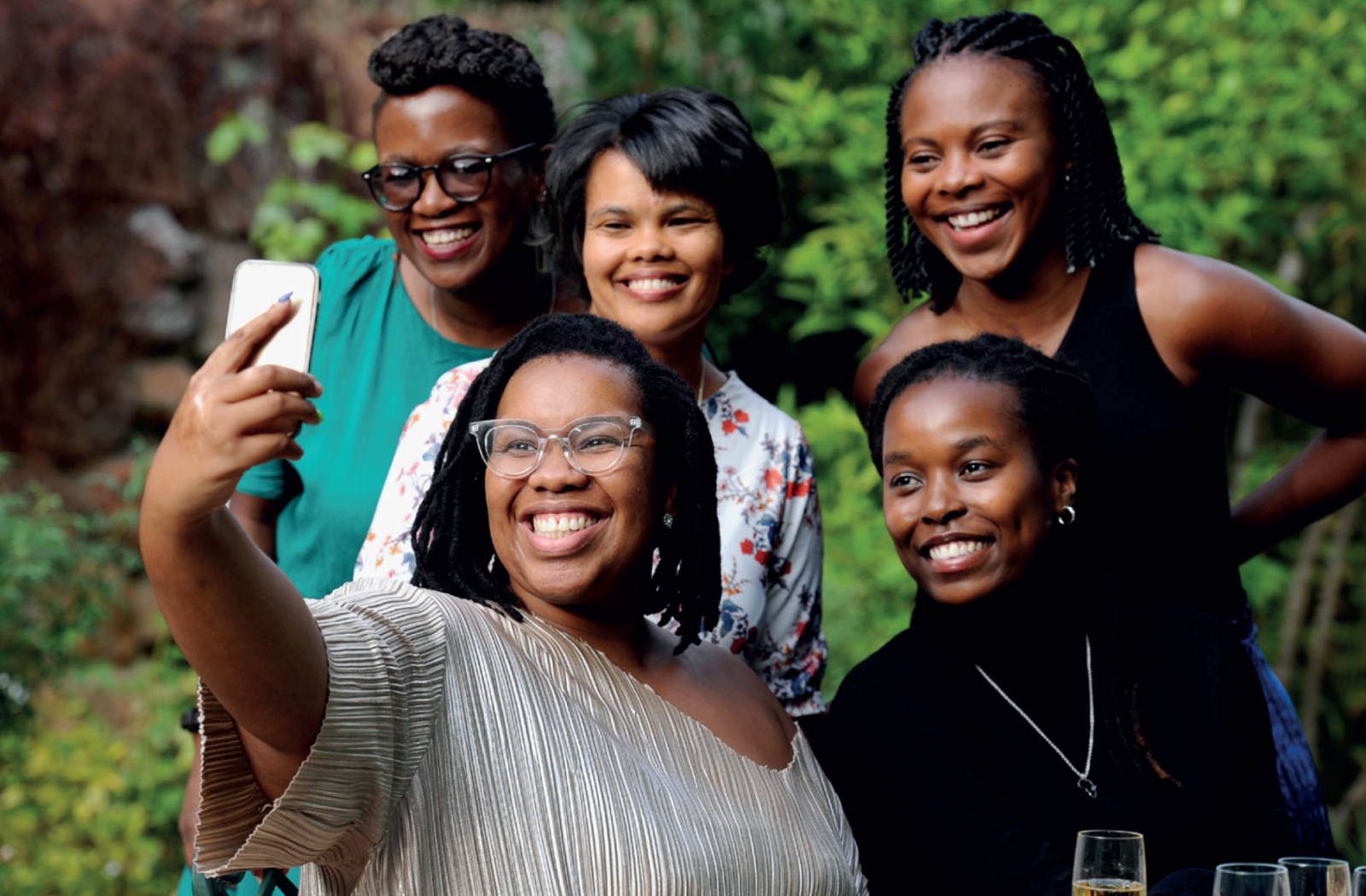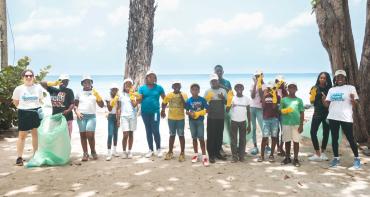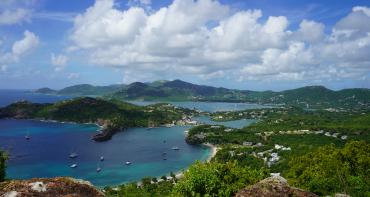Ocean Womxn: Supporting Black Women to Earn Postgraduate Degrees in Oceanography at the University of Cape Town, South Africa.

Share your own case study with us
“The Ocean Womxn Fellows have made becoming an oceanographer a cool aspiration for young
black women across South Africa – everyone wants to be like them!”Katye Altieri, Senior Lecturer at University of Cape Town and Principal Investigator responsible for founding
Ocean Womxn
Summary
In 2018, the University of Cape Town (UCT) launched the Advancing Womxn Initiative (AWI) to fund projects that build capacity among black South African womxn.¹ Senior Lecturer in the Department of Oceanography at UCT, Katye Altieri and three colleagues submitted a successful proposal to create a prestigious fellowship for black womxn to undertake postgraduate and postdoctoral studies in oceanography.
Ocean Womxn’s² inaugural cohort of five black womxn (Fellows) entered the program in 2020, and two more joined in early 2021. Ocean Womxn’s goal is to create a generation of black womxn leaders in oceanography who become role models and mentors for future generations.
The programme hired diversity consultants who held focus groups with current and past students, and supported an understanding of the cultural barriers to black womxn in the Department. As a result, Ocean Womxn offers the Fellows tailored support in three areas: financial, professional and personal.
Ocean Womxn is ever-evolving. For instance, the programme offers formalised mentorship opportunities, connecting the Fellows with black womxn mentors in other science, technology, engineering and mathematics (STEM) fields (since there are few black South African womxn oceanographers). The Fellows have begun seeking out mentors to participate in the programme, and are creating a growing network of black womxn in STEM.
Ocean Womxn is in its second of five years of funding. Altieri reports that the Fellows are flourishing and that the programme is enabling discussions about diversity in the Department, catalysing a culture change within UCT’s Department of Oceanography. There is also a plan in place to determine how the programme could be applied more broadly, potentially to other science departments in South Africa, and other oceanography departments abroad.
The issue
The 2011 South African Census found that 76 per cent of the population is black. At the University of Cape Town (UCT) in 2018, 31 per cent of professors were women; while that meant there were 76 woman professors, only 15 were black South Africans.
In the Department of Oceanography at UCT in 2018, of 73 postgraduate students, 12 were black women, and there were no black women in the faculty. Altieri says, “It’s so different from the demographics of the country. It’s impossible to miss.”
In a study of black South African women holding science scholarships, the students reported experiences of nonbelonging, inside and outside the university classroom, and feelings of alienation from their field of study. The study notes that, even though these are high-performing students, there are still barriers to their success: “They may still enter university study with limited access to dominant forms of cultural capital, including English proficiency and scientific terminology, and other forms of less tangible knowledge.”³
The response
In 2018, the Vice-Chancellor of UCT⁴ launched the Advancing Womxn Initiative (AWI), calling for proposals from women and transgender researchers from the university community to lead projects supporting the training of postgraduates and postdoctoral fellows. The emphasis was on building capacity among black South African womxn, including a category for “conducting research in a field in which womxn are in short supply.”
In the AWI, Altieri saw an opportunity to support more black South African womxn to enter oceanography and become successful oceanographers. The Ocean Womxn programme has three aims:
- Develop a prestigious research and leadership programme for black womxn that recruits, retains and enables success for the next generation of black womxn oceanographers;
- Identify and overcome barriers by creating an environment that allows black womxn to succeed and become leaders;
- Determine if the Ocean Womxn model could be applied more broadly in other ocean science programmes in South Africa or to other oceanography programmes beyond South Africa.
Ocean Womxn hired a professional consulting team specialising in diversity and transformation, which held three focus groups over several days with 15 womxn of colour from the Department and its past graduates. The consultants identified cultural barriers facing black womxn in the Department. They also reported as the most important outcomes of the focus groups the importance of co-production (involving the Fellows in creating Ocean Womxn) and the need to change the departmental culture, including involving all staff and students in the transformative process.
Based on the focus group work, the Ocean Womxn leadership identified the types of support it thought the fellows may need, and the areas where, Altieri says, “There was a way for Ocean Womxn to intervene and provide some degree of support.” As a result, Ocean Womxn provides support in three areas to help Fellows overcome fundamental barriers (Table 1).
Partnerships and support
Ocean Womxn is a project of UCT’s AWI, championed by the Office of the Vice-Chancellor, Professor Mamokgethi Phakeng. The project, which began in 2019, receives funding of R5 million (or about €2.8 million) over five years. It is led by Lead Principal Investigator Katye Altieri and Co-Principal Investigators Juliet Hermes, Isabelle Ansorge and Sarah Fawcett, all from UCT’s Department of Oceanography.

Ocean Womxn has partnered with multiple people and organisations to give the Fellows a multitude of opportunities to support their development as oceanographers and leaders. In the development of Ocean Womxn’s strategy for how best to support its Fellows to overcome barriers, and to reach potential applicants for the programme, it engaged professional services related to diversity and to social media and website development. Ocean Womxn has partnered with the South African Earth Observation Network (SAEON),⁵ which provides opportunities for the Fellows outside of academia. There are plans through SAEON to involve the Fellows in leadership opportunities with the South African government and the National Research Foundation. The programme has also partnered with South African womxn leaders in STEM fields, who act as mentors to the Fellows.
Results, accomplishments and outcomes
The first cohort of five black women graduate students began as Fellows in the Ocean Womxn programme at UCT in 2020, studying diverse aspects of oceanography.⁶ Two more Fellows were selected and entered the programme in early 2021.
Establishing Ocean Womxn has led to more than just supporting the Fellows: it has engaged the Department of Oceanography with the issue of diversity. In working with the diversity consultants, focus groups began with the Department’s past and present students of colour, and moved on to all students in the Department. Altieri says the next steps will be focus groups involving the staff, “to have discussions around race and talk about what’s troubling.”
Of the monthly mentorship program with successful black womxn in STEM fields, Altieri says the Fellows rave about the opportunity to speak with these womxn, finding inspiration in their stories. Led by the Fellows, they are quickly growing a network of black womxn in STEM.
The Fellows are also already becoming leaders and mentors. They provide curriculum-based marine education outreach to students in Grades 9 to 11, and one Fellow meets monthly with three young women who are interested in STEM careers, as a mentor to them.
Challenges
The biggest challenge for Ocean Womxn has been responding effectively to the needs of the Fellows. Because Altieri and her co-leads are women, but all white women who come from different cultures than the black Fellows, the programme and its leaders are learning to adapt as they learn more about the needs of their Fellows.
For example, the department held a pub night for staff and students to socialize that had the unintended effect of making the Ocean Womxn feel uncomfortable. The result was “showing that we are culturally disconnected with our black students.” The programme is designed to be flexible, to respond to individual needs and how those needs change over time. As the leadership team learns more about the cultural barriers facing the Fellows, it is adapting Ocean Womxn.
Altieri reports that the Fellows are thriving, and says that missteps are not a reason for inaction. “If you’re trying to make a change, you need to say things and you need to do things. You need to embrace that you’re going to completely mess it up, and that’s fine.”
Key lessons learnt
Co-development of the programme
As the researchers running the programme are not black womxn, they realised early on that it was important to know when to step aside to provide opportunities for the Fellows to make leadership decisions about Ocean Womxn. Ocean Womxn has often seen its best successes when Fellows lead the decisions about the programme. For instance, in the development of Ocean Womxn’s logo, Altieri says the Fellows worked with the graphic designer and the design went in a direction she would not have chosen. Altieri notes the importance of “listening to them to figure out what the Fellows need.”
Expert help
Ocean Womxn brought in experts in diversity and in social media and website development early in the process. The diversity experts helped identify the cultural barriers facing black womxn to entering and completing oceanography studies in the Department.
The social media and website consultants supported multiple aspects of the project, including effectively reaching out to black womxn on social media to find potential applicants.
Ocean Womxn has set about identifying the barriers for South African black womxn to their participation in oceanography and created a prestigious graduate and postgraduate programme that supports its Fellows to overcome those barriers and succeed.
Key contacts
Katye Altieri is an oceanographer and Senior Lecturer at UCT, South Africa, and the Principal Investigator leading Ocean Womxn.
Juliet Hermes is an oceanographer, Associate Professor at UCT and Manager at the South African Environmental Observation Network, South Africa. She is a Co-Investigator of Ocean Womxn.
Connect with Ocean Womxn on Twitter or at the Ocean Womxn website
Endnotes
- AWI uses the term “womxn” spelled with an “x”, recognizing this as a more inclusive term than the word “women”. “Womxn” is pronounced the same as “women”.
- https://oceanwomxn.co.za/
- Liccardo, S. and Bradbury, J. (2017) “Black Women Scientists: Outliers in South African Universities”. African Journal of Research in Mathematics, Science and Technology Education 21(3): 282-292
- https://www.uct.ac.za/main/about/management/vicechancellor
- http://www.saeon.ac.za/
- https://www.youtube.com/watch?v=OlAuNqhWrUE
Download this case study (PDF)
View all Case Studies
Media contact
- Josephine Latu-Sanft Senior Communications Officer, Communications Division, Commonwealth Secretariat
- +44 20 7747 6476 | E-mail



